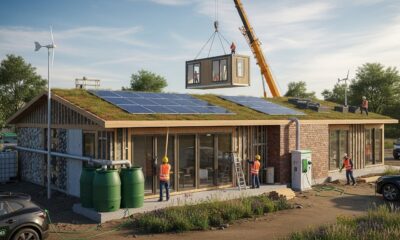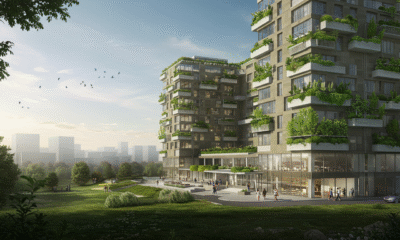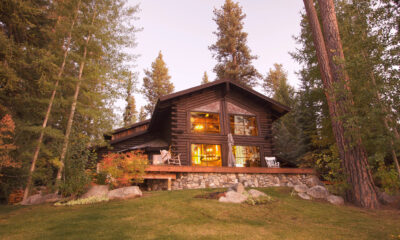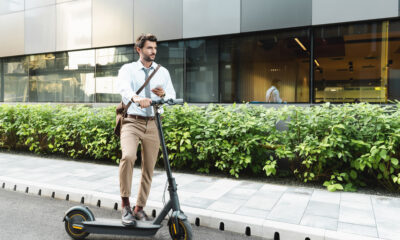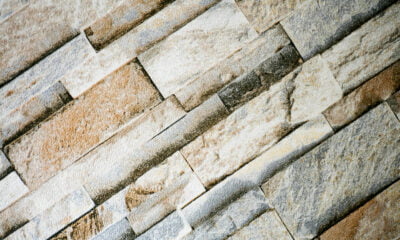
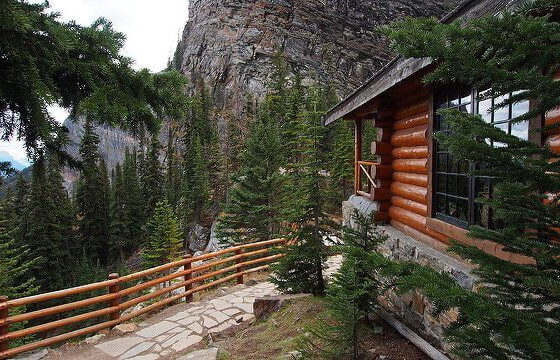
Features
Five Ecological Benefits of Log Cabins
There is a certain aspect of romance associated with the sight of smoke slowly spiraling from a log cabin’s chimney on top of a beautiful mountain. Not only is the view spectacular, but it is the ideal location to slow down, relax and become one with yourself and nature.
The views are not the only benefits of staying in a cabin. It is also the perfect way to decrease your negative impact on the environment. From how it is constructed to the way in which it stores and uses energy, there are more ways than one in which a log cabin is ecologically friendly.
Below are five compelling reasons why you should relax in a log cabin over vacations:
1. Less Energy Required to Build
The materials that are required to build log cabins are ecologically and environmentally friendly. It requires less energy to build a log cabin then it does to build a standard home. It required less energy production to harvest wood than what is needed to manufacture other materials for building.
With the construction of a log home, greenhouse gas emissions are reduced, being as about ten percent of all CO2 global emissions are brought about due to the production of concrete. The statistics state that with each production of a ton of concrete, there is also a ton of CO2 produced.
Many companies dedicated to constructing log cabins make it their goal to invest in reforestation as well as consistently be on the lookout for ways in which green building practices can be improved. When you reside in a log cabin, your carbon footprint is minimised.
2. Practices of Reclaiming Building Materials
As a way of trying to improve practices of green building, a lot of companies dedicated to building log cabins as well as contractors find way in which they can use recycled wood as well as pieces of older dismantled structures that are high quality. The sad thing is that as new structures are raised, there is no one saving hundred year old building and they are instead being knocked down.
When these materials are instead reclaimed, not only is there less waste, but it makes for an even more interesting story behind the log cabin. This means that your weekend getaway or new home could tell a powerful story.
3. Energy Efficient Source of Power
According to loghouse.ie by staying in a log cabin, you will save on energy use as well as your power bill. Heat will not pass through the logs, this means that the cabin acts as a “thermal Battery” and during the day it stores head and in the evening it releases energy, and this creates a home that is energy efficient.
That being said, if the logs of a home were not properly dried in a protective area prior to construction, air leakage and drafts could ensue. Pine, fir, spruce, cedar and larch are the best logs to help keep the heat on the inside.
4. Water harvesting System that is Natural
A lot of amateur and even some professional ecological log cabin builders use a system to collect rain water as well as other sources of water that are natural. The rainwater that falls on rooftops is collected and stored. This water is soft and does not require a lot of soaps and detergents making it gentler on plumbing than you standard hard water is.
Large amounts of energy are required to help treat, store and even supply water. By collecting rainwater, the need for energy waste is reduced and at times even eliminated. There is no risk of contamination and runoff pollutants from pesticides, chlorine, faeces or industrial chemicals when you use collected rainwater.
5. Mother Nature that surrounds us is taken into Consideration
Oftentimes log cabins are built with the nature surrounding them in mind; they are not only set with beautiful views but also in consideration of preserving the local habitat and environment. For resurgence in this matter, it is important to check the mission statement of the leaser or the builder.
That being said, solitary streams and great oak trees are generally left as they are to continue with their natural business. Many times if trees are removed from a site, they are used to construct other sections of the house or to make the furniture which will be used in the cabin. There is a lower environmental impact with the construction of a log cabin as surrounding nature is taken into consideration.
Staying in a log cabin is accompanied by many personal as well as environmental benefits, whether you are planning a quick getaway or looking to stay long term. When you want to return to nature as well as give back, you can do so by opting to stay in a log cabin.


 Environment12 months ago
Environment12 months agoAre Polymer Banknotes: an Eco-Friendly Trend or a Groundswell?

 Features11 months ago
Features11 months agoEco-Friendly Cryptocurrencies: Sustainable Investment Choices

 Features12 months ago
Features12 months agoEco-Friendly Crypto Traders Must Find the Right Exchange

 Energy11 months ago
Energy11 months agoThe Growing Role of Solar Panels in Ireland’s Energy Future
